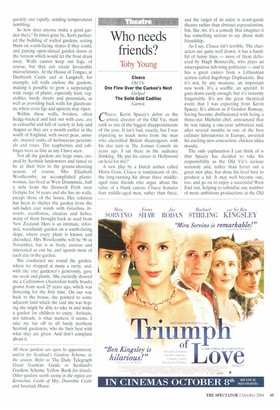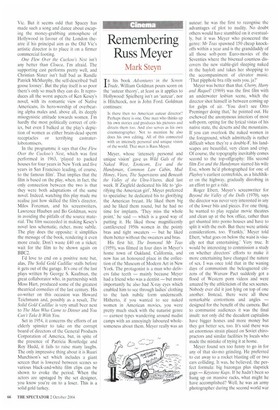Who needs friends?
Toby Young
Cloaca Old Vic One Flew Over the Cuckoo's Nest Gielgud The Solid Gold Cadillac Garrick
Cloaca. Kevin Spacey's debut as the artistic director of the Old Vic, must rank as one of the biggest disappointments of the year. It isn't bad, exactly, but I was expecting so much more from the man who electrified British theatergoers with his star turn in The Iceman Cometh six years ago. I sat there in the audience thinking. 'He put his career in Hollywood on hold for this?'
A new play by a Dutch author called Maria Goos, Cloaca is reminiscent of A/i, the long-running hit about three middleaged male friends who argue about the value of a blank canvas. Cloaca features four middle-aged men, rather than three, and the target of its satire is avant-garde theatre rather than abstract expressionism, but, like Art, it's a comedy that imagines it has something serious to say about male friendship.
As I say, Cloaca isn't terrible. The characters are quite well drawn, it has a handful of funny lines — most of them delivered by Hugh Bonneville. who plays an unscrupulous left-wing politician — and it has a great cameo from a Lithuanian actress called Ingeborga Dapkunaite. But it's not, by any measure, an important new work. It's a soufflé, an aperitif. It goes down easily enough, but it's instantly forgettable. It's not the great theatrical event that I was expecting from Kevin Spacey. It's almost as if Gordon Ramsay, having become disillusioned with being a three-star Michelin chef, announced that he was taking a one-year sabbatical and, after several months in one of the best culinary laboratories in Europe, unveiled his exciting new concoction: chicken tikka masala.
The only explanation I can think of is that Spacey has decided to take his responsibility as the Old Vic's saviour seriously and, rather than ferret out a great new play, has done his level best to produce a hit. It may well become one, too, and go on to enjoy a successful West End run, helping to subsidise any number of more ambitious productions at the Old Vic. But it seems odd that Spacey has made such a song and dance about escaping the money-grubbing atmosphere of Hollywood in favour of the London theatre if his principal aim as the Old Vic's artistic director is to place it on a firmer commercial footing.
One Flew Over the Cuckoo's Nest isn't any better than Cloaca, I'm afraid. The supporting cast performs pretty well, and Christian Slater isn't half bad as Randle Patrick McMurphy, the self-described 'bull goose looney'. But the play itself is so poor there's only so much they can do. It reproduces all the worst aspects of Ken Kesey's novel, with its romantic view of Native Americans, its hero-worship of overbearing alpha males and, above all, its deeply misogynistic attitude towards women. I'm hardly the most politically correct of critics, but even I balked at the play's depiction of women as either brain-dead sperm receptacles or terrifying castraterlobotomisers.
In the programme it says that One Flew Over the Cuckoo's Nest, which was first performed in 1963, 'played to packed houses for four years in New York and five years in San Francisco leading, of course, to the famous film'. That implies that the film is based on the play, when, in fact, the only connection between the two is that they were both adaptations of the same novel. Indeed, watching this play made me realise just how skilled the film's director, Milos Foreman, and his screenwriters, Lawrence Hauben and Bo Goldman, were in avoiding the pitfalls of the source material. The film succeeded in making Kesey's novel less schematic, richer, more subtle. The play does the opposite: it simplifies the message of the book, rendering it even more crude. Don't waste £40 on a ticket; wait for the film to be shown again on BBC2.
I'd love to end on a positive note but, alas, The Solid Gold Cadillac stalls before it gets out of the garage. It's one of the last plays written by George S. Kaufman, the great collaborator who, in partnership with Moss Hart, produced some of the greatest theatrical comedies of the last century. His co-writer on this occasion was Howard Teichmann and, possibly as a result, The Solid Gold Cadillac is very small beer next to The Man Who Came to Dinner and You Can't Take It With You.
Set in 1954, it concerns the efforts of an elderly spinster to take on the corrupt board of directors of the General Products Corporation of America, but, in spite of the presence of Patricia Routledge and Roy Hudd, it fails to raise many laughs. The only impressive thing about it is Ruari Murchison's set which includes a giant screen that is lowered between scenes so various black-and-white film clips can be shown to evoke the period. When the actors are upstaged by the set designer, you know you're on to a loser. This is a solid gold turkey.



















































































 Previous page
Previous page